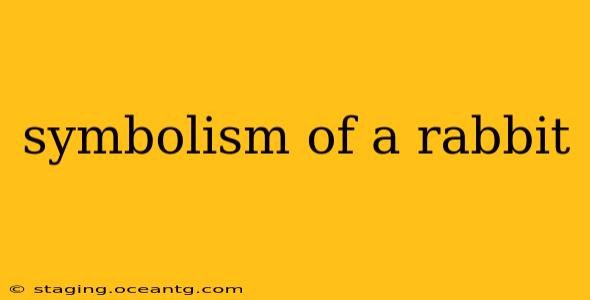The humble rabbit, a creature of seemingly simple charm, carries a surprisingly rich tapestry of symbolic meaning across various cultures and throughout history. From ancient pagan beliefs to modern-day interpretations, the rabbit's symbolism is multifaceted, often shifting depending on the context and cultural lens. This exploration delves into the diverse interpretations of the rabbit, examining its multifaceted representation in myth, folklore, and contemporary culture.
What does a rabbit symbolize spiritually?
Spiritually, the rabbit often symbolizes fertility, abundance, and new beginnings. Its rapid reproductive rate has long been associated with prolific growth and the cyclical nature of life and death, rebirth, and renewal. In some spiritual traditions, the rabbit is also linked to lunar energy, its nocturnal habits and quick movements mirroring the phases of the moon. Its connection to the moon further ties it to intuition, dreams, and the subconscious mind. The rabbit's gentle nature can also symbolize peace, gentleness, and sensitivity. However, it's important to note that the specific spiritual meaning can vary depending on the individual belief system and cultural background.
What does a rabbit symbolize in different cultures?
Rabbit symbolism shows significant cultural variation. In some cultures, it's viewed positively, while in others, it can carry more negative connotations.
-
Celtic Culture: Rabbits were often associated with magic and fertility. They were believed to possess supernatural abilities and were sometimes linked to goddesses of the earth and fertility.
-
Chinese Culture: The rabbit is one of the twelve animals of the Chinese zodiac, representing longevity, tranquility, and prosperity. People born under the rabbit sign are often perceived as kind, gentle, and cautious.
-
Native American Cultures: Different tribes held diverse interpretations. Some viewed the rabbit as a trickster figure, while others associated it with medicine, healing, and fertility.
-
European Folklore: The rabbit's symbolism often varies wildly depending on specific legends and tales, from lucky charms to symbols of witchcraft or even death.
What does a rabbit represent in dreams?
Dreaming of a rabbit can hold various interpretations, often depending on the context of the dream itself. Generally, a rabbit in a dream can symbolize fertility, abundance, or new opportunities. A white rabbit, in particular, can represent purity, innocence, and spiritual awakening. Conversely, a black rabbit might symbolize hidden fears or anxieties. The overall emotional tone of the dream is crucial for accurate interpretation, alongside the specific actions and interactions within the dream.
What is the symbolism of a white rabbit?
The white rabbit, perhaps most famously known from Lewis Carroll's Alice's Adventures in Wonderland, often symbolizes purity, innocence, and spiritual enlightenment. Its pristine white fur represents a clean slate, a fresh start, or a journey towards self-discovery. The white rabbit's appearance frequently foreshadows a significant shift or transformation in one's life, often leading towards a greater understanding of the self and the universe.
Is a rabbit a good luck symbol?
Whether a rabbit is considered a good luck symbol depends heavily on the cultural context. In many cultures, particularly those associating the rabbit with fertility and abundance, it is indeed seen as a bringer of good fortune. However, in other cultures, its symbolism can be more ambiguous or even negative. Therefore, the rabbit's lucky status isn't universal but rather context-dependent.
What are the negative symbols of a rabbit?
While largely positive in many interpretations, rabbit symbolism can hold negative connotations in certain cultures and contexts. Some folklore depicts the rabbit as a trickster, embodying cunning and deception. In some instances, it can also be associated with fear, vulnerability, or even death. Therefore, the rabbit's symbolism is not inherently positive but rather nuanced and depends heavily on the specific cultural belief system and the surrounding circumstances.
In conclusion, the symbolism of a rabbit is remarkably rich and varied. Understanding its multifaceted interpretations requires considering the cultural context, individual beliefs, and the specific scenario in which the rabbit appears. From lunar deities to Easter bunnies, the rabbit continues to capture our imagination and intrigue us with its complex and captivating symbolism.
